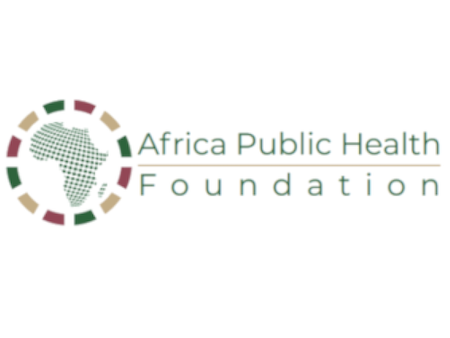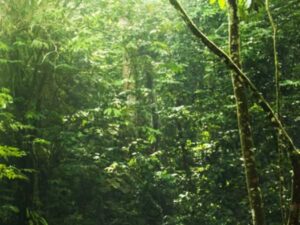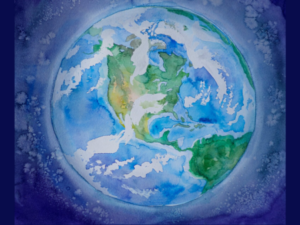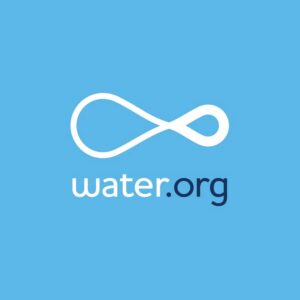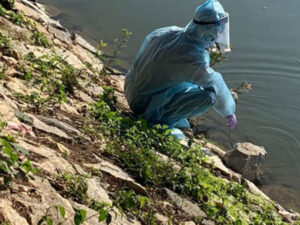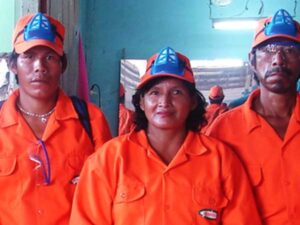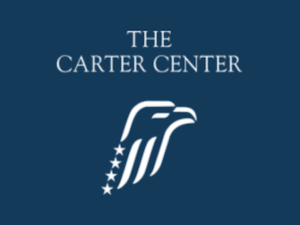Africa Public Health Foundation, founded in 2019 on the cusp of the COVID-19 pandemic, mobilizes resources and builds capacity for public health initiatives in partnership with the Africa Centers for Disease Control and Prevention and other actors.
Francisco Songane of Africa Public Health Foundation spoke with Ruth Terry on March 1, 2023. Click here to read the full conversation with insights highlighted.
Ruth Terry: Could you start by introducing yourself and describe the problem you’re addressing, and how you’re responding to it? Why does it matter? Why should people care?
Francisco Songane: I’m Francisco Songane. I’m a member of the Council of the Africa Public Health Foundation, and I’m also the interim CEO.
The whole world is familiar with the process we’re going through as a result of the COVID-19 pandemic. The COVID-19 pandemic is a bad thing that came, but it’s a good opportunity because it revealed many issues which we still need to resolve worldwide. It revealed that no matter how developed you are, if you overlook what you need to put in place in your health systems, when the disaster comes, you’re not able to respond. The pandemic was a good demonstration. Fully developed countries struggled to tackle it, not only our countries which are developing countries, or less developed countries that struggled. It revealed that everyone everywhere needs to always be perfecting the system.
We’re focusing on Africa, so this matters because for so long Africa has said that our problem in health, although it’s also a developmental issue, is the long-lasting insufficient investment in health systems. Our health systems on the continent are still weak. There are differences amongst groups of countries, of course, but generally speaking, they are extremely weak. Even those health systems which seem to improve after a couple of years, you’ll see them coming back to square one. We don’t have a steady way to do things consistently and to really reinforce health systems. As a consequence of that, people suffer, and our ultimate goal is to make sure that on the continent people should have healthy and secure lives.
If you see our motto on the partnership website, it refers to leading this process to healthier and secure lives. It is important that the Africa Public Health Foundation exists to provide this platform for partnership and to mobilize resources for the programs of the Africa Centers for Disease Control and Prevention, and all the other public health initiatives on the continent. This is a very important area that is central for development. Now there is consensus everywhere that health security and managing health issues – tackling health challenges – is not a cost, it’s an investment for future development.
Ruth Terry: Can you tell me specifically about some of the interventions that you’re doing to address this problem, and then who are the primary beneficiaries of this work?
Francisco Songane: This foundation is new, it was created in 2019, and started its operations in 2020 when the pandemic was declared. It hit hard and spread rapidly in Africa. The challenges were so many we needed to act quickly. We are envisaging the strengthening of health systems, building the workforce, addressing the different initiatives out there. We address it with two approaches. The first one, which is what we do to respond to the COVID-19 pandemic, we got the priorities from Africa CDC on what they needed to do quickly in order to respond to the COVID-19 pandemic.
Our job was to complement the work of Africa CDC, go out there, get the money that is required, work with the partners identified together with Africa CDC, and [manage] a system to complement our work in the management of the funds raised in order to make sure that the activities are implemented on the ground. That was a major front. We had to make sure that we acted quickly, and the impact was felt at the country level. But we did not lose the perspective of our aim together with the other players of building health systems. That focus is there, and that’s a major long-term vision that has to direct our activities.
Together with Africa CDC, as a response of the COVID-19 pandemic, the activities were put in a perspective of inserting it into the health systems already existing at the country level so that whatever would be done as a response to the COVID-19 pandemic will also work for other challenges the continent or a particular country has. This is very much alive. We have a consensus with the Africa CDC. The COVID-19 pandemic is much more manageable, which gives us space to look into other aspects of health.
We are urging everyone who we work with, let us move beyond the Covid pandemic response mode, and think long-term in a sustainable manner so that the capacity of Africa CDC continues to be built, and that whatever we do, we should entrench ourselves within what existed in a particular country and assist or provide the collaboration towards the improvement of that existing system in the perspective of making it strong and able to respond to routine activities. And also bring in these new elements of reinforcing their capacity of surveillance and to respond rapidly to challenges like the COVID-19 pandemic.
Ruth Terry: Would you say that’s part of what makes your approach so distinctive that you’re working on building the capacity of existing systems rather than starting something completely separate?
Francisco Songane: Absolutely, that’s our vision and that’s the way we should be working. We urge whoever we work with, when designing the sub-granting contracts with the different partners, this element is very much alive. I’m glad to realize that even the donors who provided the funding for these kinds of activities are coming into this perspective of the long-term view.
As we move beyond the Covid-19 pandemic response, beyond the emergency mode, we work with Africa CDC towards strengthening the capacity of Africa CDC itself because it’s still building the institution. The countries where activities take place have to be taken in the perspective of strengthening the system in place, improving whatever requires to be improved, innovating in the perspective of building capacity in that particular country. It’s important to highlight that this network, Africa Donor Collective who are major funders of the money coming through APHF, are clear and are committed to work towards this long-term view.
Ruth Terry: What are some insights and teachable lessons that can be taken from your work that others can use?
Francisco Songane: One important lesson is the readiness to respond and the readiness to work with Africa CDC to meet the challenges in the different countries. I’m emphasizing this because this network, the Africa Donor Collective, did that. They said we are ready, we want to support the Africa CDC in order to face the challenges in the continent. They were open, they were quite committed, and they worked consistently with the Africa Public Health Foundation because they identified this platform, which is a foundation created by Africa CDC, as a good platform to provide support to their network. To work as a conduit of the funds they raised in order to fund the Africa CDC program. They put trust in us, in Africa CDC and in APHF.
We managed the grants effectively within 66% of execution in terms of total amount of money available, and with the impact happening at the country level. This was a very good message for everyone, not only for the network of partners, for Africa CDC, but for the countries themselves which were quite cognizant of the work being done. This is something that we should emphasize because it was this togetherness, this collaboration and solidarity within the African continent together with its pattern that allowed the Africa CDC to respond properly. I’m putting this as number one because if we look at the COVID-19 pandemic worldwide, we saw major discrepancies. We saw that the solidarity that should exist worldwide for this particular situation was not there.
When it came to the tools which were needed, particularly the new tools to manage the COVID-19 pandemic response, the particular case of access to the vaccines was quite illustrative. It demonstrated that the solidarity that we would like to see happening in this kind of situation is not there yet. But Africa did not just stop there and lament, they found innovative ways of addressing these differences. Again, the institutions within the African Union who should emphasize the role of the heads of state, the role of the commission of the African Union, they backed the African CDC fully in what Africa CDC was doing, in order to circumvent this situation of being left out in terms of accessibility of tools that were critical to combat COVID-19. Innovative solutions were devised and backed by this network of Africa Donor Collective.
They rallied behind the Africa CDC to provide additional funding. The effectiveness of the Africa Public Health Foundation was to look at the many partners and provide a platform which created a pooled mechanism of funding for the COVID-19 vaccine rollout. The partners agreed and it raised $11 million for Africa CDC to work with its partners for the rollout of COVID-19 vaccine.
This is another example to highlight the innovation found in converting a challenge into an opportunity and finding new ways of operating. New approaches were taken, like creating the African Medicines Agency, a structure that ensures quality control to back up the initiative Africa is taking as part of the trial vaccine manufacturing. This innovative way of raising money through a pooled mechanism is a method which could work in the future and will be quite important in this long perspective of working towards the strengthening of the systems in the African country.
Ruth Terry: It sounds like there’s so many different partners and partnerships and stakeholders involved in what you do. What are some practical ways that you are able to manage the communication and make sure everyone’s on the same page and working towards the same goal?
Francisco Songane: Managing many people is tough and time-consuming, but the disaster brought about by the COVID-19 pandemic ignited this unity approach amongst about 200 partners around the African Donor collective. They were quite consensual in the way of operating, and they found APHF as a major structure to rally around. We worked continuously and permanently with them, with regular monthly discussions amongst the Africa Donor Collective, APHF, and Africa CDC. They had different working groups where APHF was always participating.
I think this approach of true partnership, of getting this direct in-person collaboration, although that in-person was being made virtually of course because of the COVID-19 restrictions, but virtually APHF was present in those kinds of discussion working groups. That was a major lesson we can take forward that facilitates the process of collaboration because you know who you are dealing with, you know the different perspectives around, and they know the perspectives of Africa Public Health Foundation. As a demonstration of this good working together on several occasions, the African Donor Collective network did approach us to work with them in the perspective of supporting their secretariat on how to do their own collaboration. Discussions are still going on. We said we’re ready, whenever the time is appropriate, who can take this forward? The other thing which will play a role moving forward is this consensus that we should work beyond the emergency mode, and take the long-term perspective towards the strengthening of the health system, which coincides fully with the view of APHF and the view of Africa CDC. This perspective is bought in to by all parties and will be a unified tool to work in the future.
Ruth Terry: What are some of the ways that you measure success?
Francisco Songane: One way I measure success is by looking at what Africa CDC did as a response to the COVID-19 pandemic. That was excellent. Amidst the difficulties we had, all the voices were saying, wait, this COVID-19 pandemic would really destroy Africa given the weakness of the health systems. When people were seeing what was happening in the rich countries, people dying in dozens, in hundreds, in the most sophisticated health systems, the perspective was, well, this might wipe out the population in some of the countries. But Africa CDC together with the countries, and the leadership of the African Union, the direct involvement of the Africa heads of state and the African Union Commission to fully back Africa CDC, this was a major element of success.
That was a good example of the success of how things should be done in order to achieve good results in a situation like this. The other one, is that we saw a situation of poverty in terms of technology, what I would call the poverty in technology. Many countries in the continent did not have a capacity to even test for SARS-CoV-2, which is the virus that causes COVID-19. But quickly, the Africa CDC, working with the existing institutions in the continent which had some capacity, and working with the partners who provide the support from abroad, they managed to build capacity and set conditions in different countries in the continent for testing. They introduced the training for temperature sensitive logistics. If you remember the COVID-19 vaccine has one peculiarity, the very short shelf life and very complicated logistics because it requires very low temperatures at the level of -60/-70.
In Africa, the [infrastructure] for vaccination is not for this kind of vaccine but for the regular vaccines, for the expanded program of immunization. The procurement of drugs, which was not there as an important element within the African Union Commission, was triggered by the work done by Africa CDC and other partners. The continent now is gearing up towards participating in drug manufacturing, in getting good systems to do the proper purchasing of commodities. There is work already in progress of setting up steps in some countries in Africa, in order to assess the feasibility of manufacturing vaccines and drugs. This, of course, is an area that requires good care because you’re not just going out there and setting up your own factory. There are steps which have to be respected, but building on the capacity already existing in some of the countries, this is being developed.
Those are the important ways of measuring success. But we should not forget the people who we want to serve. The partners managed to extend the COVID-19 vaccination to those places where it did not exist. There is one way we as APHF played a role together with the partners through the funding provided by Africa Donor Collective is to work with Africa CDC towards these new ways of reaching the unreachable. We start with training of rapid responders at the country level, next to the community, using the resources which were provided by the Skoll Foundation. To train those people, and reach out to good activists at the community level, in order to address the issue of hesitancy, misinformation, and getting people to know what the COVID-19 is, and how they should respond to it. I think that was a measure for success. If you have time, you’ll talk to Eunice [Chege, Communications Lead for Africa Public Health Foundation]. She might lead you to vivid stories from the community, demonstrating the difference which was made because of the activities that took place using these programs to combat COVID-19. Beautiful stories.
Ruth Terry: What are some of the things that maybe haven’t worked so well? What are the lessons you’ve learned?
Francisco Songane: It is important to mention that there are things which might not have worked so well. Number one, I have said that several times in the meetings with the network Africa Donor Collective, I’m glad then that we’re really in a consensus of this long-term perspective. Because before what was happening initially, there were some of the partners who were saying, no, I can give money, but I just want to do it for IT. I can give the money, but I just want to do it for the purchasing of vaccines. I mean, when you are dealing with the pandemic, the disaster for this dimension, if you get an institution which is new after the CDC still being built, and tearing it, pushing, pulling it in a different direction because you get their staff running after IT, running after vaccines, running after community health workers, and they lose track to the whole picture. The integrated approach that is required.
This is a major message I will take as we move forward. We have to reflect on these things and say, well we saw that this doesn’t happen much, let us get behind one program, we fund the priorities of Africa CDC. Whatever public health initiative that will be out there, and to which Africa Public Health Foundation could provide the platform, this will be the same approach. The integrated approach is based on the plan of wherever we want it to work. There is progress, and I mentioned one of the results, one of the demonstrations of this progress, which was the creation of the pooled mechanism for the COVID-19 vaccine rollout. The donors agreed to pool the money into one pot, which we called the pooled fund for the COVID-19 vaccine rollout. This is an example, we have to expand, scale up and say it would be our way of working together in the future.
Ruth Terry: I think it’s an important point you’re raising. My background before journalism was in nonprofit fundraising and I think in addition to the challenge of raising funding in general, there’s also that challenge of needing to educate people on where their funding is going and how it can be used most appropriately, and not just have it earmarked for specific things. Is there anything else you would like to talk about that we haven’t covered?
Francisco Songane: I’m glad to hear that, I think we needed to pursue this. The other element that I think needs to be improved is the level of funding and the timing because when you start an activity, the activity will not last for one month or two months. There are some activities which are for years, and when you start, if you start without a sufficient amount of money, you are bound to take an approach which is step by step rather than taking the long term perspective in order to secure the sustainability in whatever you are doing. One thing we could improve is that we know what Africa CDC needs. They will tell us what programs they want funded, and Africa CDC is now working on investment cases of the specific programs. That will be a good document to guide what level of funding is required.
One ask here is that whoever will continue to participate with us in this journey, let us make an effort to give the level of funding that is required at the beginning, so that we would give the security to Africa CDC and the different institutions which would be working in the long-term perspective, and make this activity as part of the system strengthening that we all talk about.
Establishing structured mechanisms of coordination is important. We worked very well, but it is time-consuming. It requires many people doing many things. If we come up with a structured way of collaboration with the proper mechanisms and proper rules of engagement, that will facilitate our work. Meetings are good, repeated meetings are good, but sometimes can be destructive for whoever is required to focus their attention on the activities to be delivered. Those are the suggestions, or the table to answer your question.
Click here to read the full conversation with insights highlighted.
Ruth Terry is an award-winning social impact writer based in Istanbul, Turkey, with bylines in Al Jazeera, BBC Travel, National Geographic, NBC Think, The New York Times, The Washington Post, Time, and more. Writing across topics and genres, she has covered everything from race to roller skating through a lens of social justice and equity.
* This interview has been edited and condensed.
Learn about other social innovations created from the pandemic.

